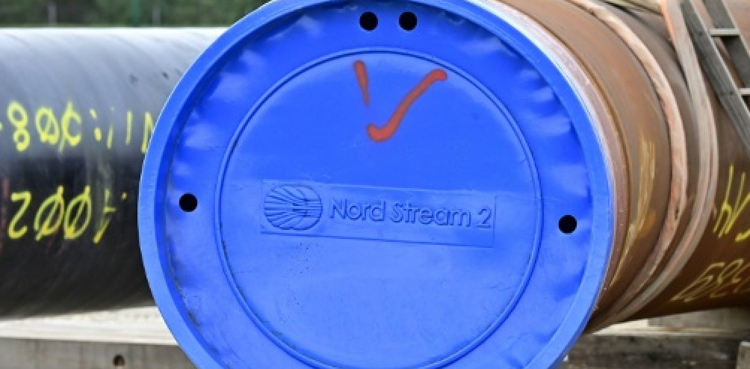
LUBMIN: US President Donald Trump may loathe it, but the Russia-Germany gas pipeline Nord Stream 2 that runs under the Baltic Sea is set to be completed by the end of the year, its operators predict.
This week the consortium led by Russian energy giant Gazprom took international media to the Baltic coast town of Lubmin where the existing Nord Stream 1 and its new parallel pipeline terminate.
“The main installations have been completed, the shut-off valves have been installed, so we can assume that the project will be completed by the end of 2019,” said project spokesman Jens Mueller.
The 11 billion euro ($12.4 billion) project is set to double Russian gas shipments to the EU’s biggest economy.
This has sparked concerns about Western Europe’s increasing dependance on Russian gas, as well as Moscow being able to increase pressure on Ukraine as it is no longer as reliant on the country for transit of supplies.
Washington has bitterly opposed the project, with Trump charging in angry tweets last year that it made Germany a “captive” of President Vladimir Putin’s Russia.
Chancellor Angela Merkel’s government, anxious to placate Trump, has meanwhile agreed steps to boost German purchases of US liquefied natural gas.
Economy Minister Peter Altmaier, Merkel’s close confidant, Wednesday said Germany would pave the way for the construction of new LNG port terminals to “boost competition between different gas imports”.
Pharaonic project
Meanwhile, on the edge of a pine forest at Lubmin, Mecklenburg-Pommerania state, hundreds of workers with heavy construction equipment have been labouring at the pipeline’s sandy landing site.
Other crews are busy offshore on a fleet of 20 ships to lay the 1,230 kilometre (764 mile) steel-and-concrete pipeline through the maritime territories of Russia, Finland, Sweden, Denmark and Germany.
The pharaonic project still faces an obstacle as Denmark has so far failed to give approval to the controversial and geopolitically sensitive pipeline.
“We have good reason to think” that the green light will be given “in the near future,” said Mueller.
Since its inception, Nord Stream 2 has caused controversy.
Proponents say it will help secure Europe’s gas supply at lower prices by sending an additional 55 billion cubic metres per year.
Several Eastern European countries have opposed the project which effectively bypasses them and deprives them of lucrative transit fees.
They charge that Moscow in particular aims to isolate Ukraine.
The country has long key for the transit of Russian supplies to Western Europe, but price disputes between Moscow and Kiev have led to several disruptions of supplies to other European countries.
Ties between Kiev and its Soviet-era master Moscow were then shredded after a popular uprising in Ukraine ousted a Kremlin-backed regime in 2014. Russia retaliated by annexing Crimea and supporting a separatist uprising in the east of the country.
Combined with the planned TurkStream pipeline across the Black Sea, Nord Stream 2 would theoretically allow Russia to bypass Ukraine in providing gas to Europe.
US sanctions threat
Merkel long insisted Nord Stream 2 is a “purely economic project” but has more recently given assurances that Ukrainian interests will be protected.
In the third quarter of 2018, pipelines through Ukraine still accounted for 48 percent of Russian gas shipments to Europe, according to the European Commission.
The consortium insists that Ukraine will retain its role as a transit country.
Currently out of an annual total of 170 billion cubic metres of Russian gas shipped to the European Union, 93 billion cubic metres pass through Ukrainian pipelines.
“It’s simple mathematics,” said Mueller, pointing out that since Nord Stream 2 will be able to handle a maximum of 55 billion cubic metres per year, Ukrainian pipelines will still be needed.
A legal threat hovers over the project, which also includes Germany’s Wintershall and Uniper, Dutch-British Shell, France’s Engie and Austria’s OMV.
Trump’s US ambassador to Germany, Richard Grenell, in January warned that companies operating in the Russian energy export pipeline sector are in danger of US sanctions.
Its proponents argue that Nord Stream 2 does not fall under a 2017 law targeting Russia, the Countering America’s Adversaries Through Sanctions Act.
Questioned by AFP about the sanctions threat, the German government pointed to the “private business” nature of Nord Stream 2, while the consortium declined to “comment on political decisions”.
The post Russia-Germany pipeline on track despite US pressure appeared first on ARYNEWS.
from Business – ARYNEWS https://ift.tt/2Yuc6Vr
